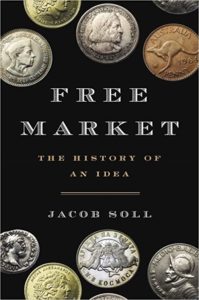
In the City Journal, I have reviewed Jacob Soll’s new book, Free Market: The History of an Idea.
Books arguing that “free market thought fails to account for periodic and devastating market failure,” or claiming that Milton Friedman stood for “libertarian corporate social-Darwinism” and rebuking him for his supposed affinity for Augusto Pinochet’s Chile, are not in short supply. That modern free-market economists were “crusading Cold War warriors with little patience for nuance or for contradictions in their own thought” is a ritornello of many scholars. …
Yet Jacob Soll is smarter than his many competitors. His Free Market: The History of an Idea starts with Cicero and doesn’t get to Friedman until page 250. Soll enlists the wisdom of the ancients and 2,000 years of history in his battle—the enemy being, in this case, the idea of a deregulated economy, in which the government is severely limited. Soll refrains from using pejoratives like “neo-liberalism” and refers instead to the “free market.” Such chivalry—calling his adversaries what they would like to be called—is commendable. Still, a clearer definition of “free-market thought” and an explanation for his use of this expression would have been helpful in a broadside against individualism or capitalism.
Soll is certainly more learned (and more interesting, when he speaks of things he actually studied and pondered) than your average critic of “neoliberalism” and, thank God, doesn’t use that word. Still the book is disappointing. Barton Swaim wrote a powerful review for the Wall Street Journal, a few days ago. Professor Soll replied to that explaining that “my critiques of free-market thinkers aren’t made in bad faith. I admire Friedrich Hayek and Milton Friedman and treasure individual liberties and economic freedoms. I simply remain perplexed that subsequent leaders dedicated to such ideas supported alliances with segregationists, whose ideas were the stark opposite of universal libertarianism”.

I did not touch the point of that juxtaposition in my review, thinking that was just derivative, in Soll’s work, from his wider worldview. Note that even in Swaim’s excellent article this is merely tangential, whereas he aptly points out that “for Mr. Soll’s book to work—and this is true of many such books by economists, pundits and historians of the political left—he has to pretend that the free marketeers have basically run the show for the past 70 years”. So, Soll’s reply (though of course circumscribed by the needs of brevity) focuses on scoring a rhetorical point rather than addressing a substantial issue. It didn’t make me think higher of him .

READER COMMENTS
Thomas Lee Hutcheson
Oct 3 2022 at 12:00pm
The idea “that the free marketeers have basically run the show for the past 70 years” is pretty funny, and “neoliberals” even funnier.
If “Neoliberals” were running things we’d have (maybe not all of) the following
Progressive consumption tax.
No corporate income tax
Social insurance financed with a VAT, not a (capped) tax on wages.
Taxation of negative externalities (especially net emissions of CO2 into the atmosphere) instead of administrative controls. [Congestion taxation of street and road use.]
No “economic” restrictions on international trade. (Militarily strategic and human rights objectives are separate issues.)
Immigration policy that selects for high skills and education.
Land use regulation which does not discourage urban residential and commercial development
Minimal occupational licensing.
Higher EITC instead of minimum wages.
Use of const benefit analysis in making administrative decisions.
Health insurance subsidies to individuals, not through employers.
Instead we have dreary deadlock between Progressives and Conservatives.
Kevin Corcoran
Oct 3 2022 at 1:34pm
I very much appreciate this point. Whenever I hear or read someone on the left argue that free market capitalism has been dominant in public policy, I am left flabbergasted and wondering what on earth they could possibly mean. The best answer I can come up with is leftists will notice the occasional free market rhetoric of some policymakers (and even this is pretty sporadic) and conclude this means free market policies are actually implemented in practice. So to them, NAFTA would be an example of a free market policy. I mean, the words “free trade” are right there in the name of the policy itself! What more proof do you need???
But of course, NAFTA did not establish free trade. A genuine free trade agreement would take about a single sentence to establish: something like “All signatories to this agreement will impose neither tariffs nor import-export restrictions” would cover it. If a policy consists of thousands of pages of dense legalese, like NAFTA or the Trans Pacific Partnership, then it’s not establishing “free trade.” It’s just another form of politically managed trade.
Mark Z
Oct 3 2022 at 3:08pm
Which subsequent leaders favored alliances with segregationists? The issue of segregation was a settled question by the 80s so I’m not sure who he’s referring to. Barry Goldwater perhaps? But he actually had some principled, libertarian objections to public accommodation laws that can’t just be written off so easily as malicious or hypocritical.
Comments are closed.